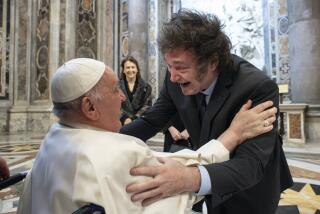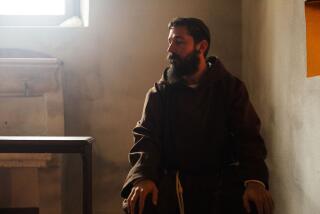Pope Francis: A Jesuit in an office he isn’t supposed to seek
As a Jesuit, Pope Francis comes from a religious order that traditionally shuns such high office – one key reason the Argentine is the first Jesuit to lead the vast Roman Catholic Church, scholars say.
“We don’t usually feel called to do that,” said Father T. Frank Kennedy, director of the Jesuit Institute at Boston College. “In our final vows, we promise not to seek church offices. It’s only when the Holy Father orders us to do it that we accept.”
Avoiding such ecclesiastical honors is one major trait of the Jesuits, formally known as the Society of Jesus. Founded in the 16th century by St. Ignatius Loyola, the religious order is known for its missionary reach, intense focus on education and devotion to the poor. Ignatius Press founder Father Joseph D. Fessio called them “kind of God’s Marines,” committed to go anywhere and do anything to help the church.
Yet Jesuits have also found themselves at odds with the Vatican from time to time, as their teachings to find God in all things thrust them into the outside world. Some experts believe that also may have made them unlikely candidates for the papacy in the past.
“Our work with the poor and people on the margins sometimes struck some as too experimental, radical and even dangerous,” Father James Martin wrote for CNN. He quoted “an old Jesuit” as saying that “when you work on the margins … you sometimes step out of bounds.”
Jesuits range from strictly conservative to radically liberal, but are united by lengthy spiritual exercises meditating on the life of Jesus. Yet they are also global in outlook and outward in their focus, plunging them into controversial issues as they grapple with other cultures, said Father Gerald McKevitt, professor of Jesuit studies at Santa Clara University.
As Jesuits evangelized in China, for instance, they argued for allowing Chinese converts to continue the Confucian practice of venerating ancestors; the church banned the practice despite their arguments. Such clashes underscored fears that the Society of Jesus was too independent.
Those tensions erupted in 1773, when Pope Clement XIV issued a decree suppressing the Jesuits. Despite the ban, the Jesuits survived and continued their work before the decree was fully reversed in 1814.
Disagreements have surfaced from time to time since: In 1981, Pope John Paul II appointed his own delegate to govern the Jesuit order, replacing its chosen nominee. Clashes over the liberation theology movement and other issues have arisen with the Vatican and among Jesuits themselves.
“What makes the Jesuits so fascinating is that they’re all over the board,” said Father James Weiss, an associate professor of church history at Boston College.
The new pontiff has straddled those divides and stayed on a more orthodox path: When Pope Francis was a priest in Argentina, many Jesuits were upset by “his stout refusal to go the route of liberation theology,” Weiss said. His stands on other issues such as gay marriage and abortion are firmly in line with church tradition.
“I honestly don’t think it’s going to make much of a difference that he’s Jesuit,” Fessio said. “He happens to have been a Jesuit, but that’s not why he was elected pope.”
If his Jesuit identity is reflected in the future church, experts say, it is most likely to emerge in a renewed focus on the poor, as his past work in Buenos Aires already suggests.
Several experts pointed out that the Jesuits are still a young order in the history of the church. Adherents from older religious orders, such as the Dominicans and Franciscans, have become pontiff in the past, said Father Thomas Rausch, a Jesuit priest who is professor of theological studies at Loyola Marymount University.
“A lot of the old borders are more fluid than we thought. He’s a Jesuit who took a Franciscan name wearing Dominican robes!” said Father David Meconi, assistant professor of theological studies at St. Louis University. “It shows the church is thinking a little more outside the box.”
ALSO:
Pope Francis, a New World pontiff, faces old challenges
Pope Francis: Humility and simple life lead Jesuit to papacy
Pope Francis delivers stern message to cardinals at Sistine Chapel
More to Read
Sign up for Essential California
The most important California stories and recommendations in your inbox every morning.
You may occasionally receive promotional content from the Los Angeles Times.










